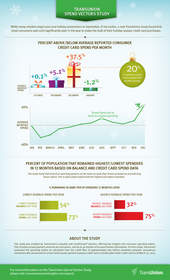CHICAGO, IL--(Marketwired - Oct 30, 2013) - While many retailers begin year-end holiday promotions in September, if not earlier, a new TransUnion study found that most consumers wait until significantly later in the year to make the bulk of their holiday season credit card purchases. TransUnion's study found that consumers, on average, have nearly 40% more spend reported on their credit cards in December than they do in a typical month. The study also found that 20% of consumers have at least twice as much spend on their credit cards reported in December as they do in an average month.
Though consumer spend reported in November is 5% higher than a typical month, this total is only third highest for the year and is significantly lower than spend levels reported in December. The second highest spending month for the year typically occurs in August, when reported consumer spend is 7% more than an average month, likely because of the "back to school" shopping season.
Percent Above/Below Average Reported Consumer Credit Card Spend for a Given Month
| JAN | FEB | MAR | APR | MAY | JUNE | JULY | AUG | SEPT | OCT | NOV | DEC |
| -1.2% | -21.9% | -17.0% | -8.8% | -5.3% | 0.1% | 1.4% | 7.0% | 2.9% | 0.1% | 5.1% | 37.5% |
The data for this analysis come from TransUnion's Spend Vectors study, where for the first time ever TransUnion was able to gain valuable insights into consumer spending habits through its new CreditVision® product. Some of the enhancements to the credit data include actual payment amounts by consumer and up to 30 months of account history information where available for key metrics.
"Our enriched credit data provide a historical context for consumer spend levels, something credit bureaus previously had not been able to observe," said Ezra Becker, vice president of research and consulting in TransUnion's financial services business unit. "Our data clearly show that significantly more consumer spend is reported in December than in a typical month, even though many retailers offer considerable incentives much earlier in the holiday season. As importantly, we also found that those individuals who spent the most in a given year were likely to be ones to do so the following year. This is an important metric for lenders who wish to target their product offerings to best match the needs of consumers."
Among high-spending consumers, the level of holiday credit card spending in a given year strongly rank-orders the level of holiday card spend observed in the following year, according to the study. To determine this, TransUnion segmented the highest spenders of 2011 into 20 groups based on reported December spend. Each of these groups continued to rank their holiday spend in the same order in 2012.
The TransUnion study has other important implications for lenders, because it found that the annual spending traits of consumers clearly outperformed consumer balances as a predictor of how consumers will spend in the future.
"Prior to the availability of enriched credit data, lenders often looked at credit card balances as a proxy for spend when attempting to forecast future spending at the consumer level," said Becker. "TransUnion's analysis found that annual spend is a far better predictor of future spending patterns than simply looking at balances. This was particularly evident with the highest and lowest spending consumers."
Percent of Population that Remained Highest/Lowest Spenders* in the next 12 Months Based on Balance and Credit Card Spend Data
| % Remaining in that tier of SPENDERS 12 Months Later | % Remaining in that tier of SPENDERS 12 Months Later | ||
| Lowest Average BALANCE Last Year | 54% |
Lowest Average SPEND Last Year | 73% |
| Highest Average BALANCE Last Year | 32% |
Highest Average SPEND Last Year | 75% |
*Top and bottom quintiles
"This finding suggests there is a three in four chance that the same individuals who spend either the most or least on their credit cards will remain the same the following year," said Becker. "Financial institutions, who had previously only been able to observe their own portfolios for spend information, can now use these data to better market their products to consumers. As a result, consumers utilizing credit cards may receive better interest rates, better credit lines or more rewards from lenders--in other words, a better fit of products to their needs."
For more information on the TransUnion study, please visit: www.transunioninsights.com/spend
About the TransUnion Study
TransUnion evaluated the spending habits as calculated from the credit files of approximately two million randomly sampled, anonymous consumers who possessed an active bank-issued, general purpose credit card or private label retail credit card as of March 31, 2013.
About TransUnion
As a global leader in credit and information management, TransUnion creates advantages for millions of people around the world by gathering, analyzing and delivering information. For businesses, TransUnion helps improve efficiency, manage risk, reduce costs and increase revenue by delivering comprehensive data and advanced analytics and decisioning. For consumers, TransUnion provides the tools, resources and education to help manage their credit health and achieve their financial goals. Through these and other efforts, TransUnion is working to build stronger economies worldwide. Founded in 1968 and headquartered in Chicago, TransUnion reaches businesses and consumers in 33 countries around the world on five continents. www.transunion.com/business
Contact Information:
Contact
Dave Blumberg
TransUnion
E-mail
Telephone (312) 972-6646
